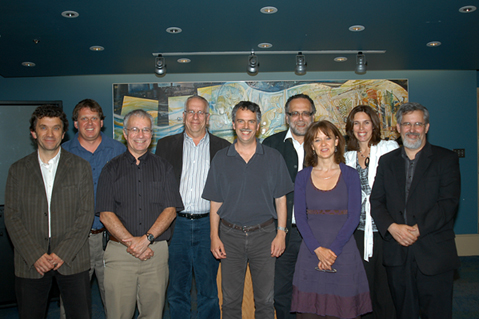Study Session of the CIRLM: What autonomy and recognition for OLMC? - June 2010

From left to right: André Magord, Éric Forgues, Rodrigue Landry, Michel Seymour, Will
Kymlicka, Joseph Yvon Thériault, Johanne Poirier, Ingride Roy and Pierre Foucher.
Absent: Linda Cardinal
The Canadian Institute for Research on Linguistic Minorities, in partnership with the Canadian Institute for Research on Public Policy and Public Administration and the Université de Moncton, held a multidisciplinary study session on June 11, 2010 that brought together many experts on the topic of linguistic minorities from across Canada and Europe to discuss the form of autonomy to which official language minority communities (OLMC) in Canada may aspire.
The study session was unique in that it allowed us to hear experts on national minorities, among others, who had only slightly or not yet addressed the status of OLMC in their work.
In the opening conference, philosopher Michel Seymour presented criteria that need to be met for a community in a minority situation to achieve autonomy, i.e. the presence of a legal framework, the right to institutions and presence in a territory. He mostly insisted on the importance of having constitutionalized rights.
Afterwards, Joseph Yvon Thériault identified two main approaches measures in the promotion of official languages, i.e. the proponents of an approach based on the existence of two nations or two societal cultures (cf. Rodrigue Landry) and the proponents of a so-called pragmatic approach that promote autonomy within the provinces (cf. Linda Cardinal). Linda Cardinal then gave an overview of the works addressing this issue to insist on the importance of institutional completeness requiring, in her opinion, repoliticizing in order to build a foundation for the autonomy of French-speaking communities in minority situations.
From a legal perspective, Johanne Poirier and Ingride Roy attempted to demonstrate how international law can provide options to have us consider the rights of OLMC. Referring to the works of Iris-Young, Johanne Poirier encouraged researchers to show more moderation in establishing minority categories. Ingride Roy insisted on making a distinction between the right to protection and the right to participate, and emphasized the latter because it is aimed at effectively involving the minority population in community life.
In the afternoon, from an anthropologic perspective, André Magord presented the situation of Acadians and their lifelong quest for autonomy to address current autonomy issues. He drew attention to the importance for Acadie to find its collective singularity. Rodrigue Landry then presented an approach to autonomy that would build upon the presence of two societal cultures in Canada. The OLMC were described as an extension of these societal cultures. Éric Forgues then inquired as to whether the current partnership between the State and the French-speaking communities in minority situations constitutes an impediment or a springboard towards further autonomy.
At the end of the day, the world-renowned philosopher Will Kymlicka responded to the comments made over the course of the day by raising three red flags. Firstly, it is important to not confuse the three minority communities making up the aboriginal population, the national minorities and the immigrants. Then, even if it is likely to encourage an active participation from minority communities, international law does very little for the national minorities’ right to autonomy. Finally, Kymlicka encourages us to explore the possibilities that lie within the legal framework in order to move autonomy forward within linguistic minorities in Canada.
This study session will include a follow-up. First, the Office of the Commissioner of Official Languages has mandated three PhD students who attended the session in order to conduct an analysis summary to identify the impact on official language communities in minority situations. An event will be held to continue debating autonomy and recognition with community spokespeople. The proceedings of the study session will then be published in the new journal Minorités linguistiques et société/Linguistic Minorities and Society that will soon be launched by the CIRLM and its partners.
